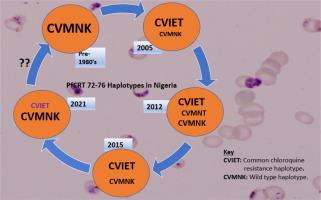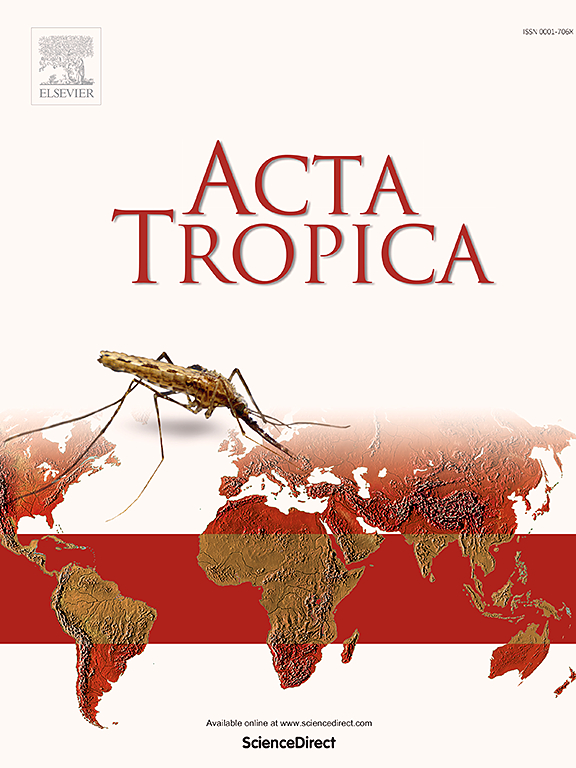Frequency of chloroquine-resistant haplotype of Plasmodium falciparum (CVIET) in Ibadan, Southwest Nigeria 17 years post-chloroquine withdrawal
IF 2.1
3区 医学
Q2 PARASITOLOGY
引用次数: 0
Abstract
The replacement of chloroquine with artemisinin-based combination therapies (ACTs) for over a decade has had varying impacts on the ability of the malaria parasite to sustain its chloroquine resistance prowess in different malaria-endemic regions. We evaluated the frequency of Plasmodium falciparum chloroquine resistance transporter (PfCRT) mutations in Ibadan, Nigeria 17 years after the replacement of chloroquine with ACTs for malaria treatment. Fragments of PfCRT gene from genomic DNA of microscopically confirmed P. falciparum-infected patients were amplified and sequenced. There were 19% CVIET mutant and 81% CVMNK wild-type haplotypes on residues 72–76. A220S change were found in 16.7% of samples occurring concurrently with the CVIET haplotype, while a Q271E mutation occurred in a PfCRT wild-type isolate. The reduced prevalence of the PfCRT mutant alleles in this study compared to previous reports suggests a gradual disappearance of chloroquine-resistant malaria parasites following reduced drug pressure. It may also be a result of fitness demand on the parasites in attempts to evolve resistance against the current first-line regimen. However, evaluating the prevalence of other chloroquine resistance markers such as Plasmodium falciparum multidrug resistance 1 gene mutations in this population, and a more robust sample size will help to consolidate these findings.

尼日利亚西南部伊巴丹地区停用氯喹 17 年后恶性疟原虫耐氯喹单倍型 (CVIET) 的频率。
十多年来,青蒿素类复方疗法(ACTs)取代了氯喹,这对不同疟疾流行地区的疟原虫维持氯喹抗药性的能力产生了不同的影响。我们对尼日利亚伊巴丹地区恶性疟原虫氯喹抗性转运体(PfCRT)变异的频率进行了评估。对经显微镜确诊的恶性疟原虫感染者基因组 DNA 中的 PfCRT 基因片段进行了扩增和测序。残基 72-76 上有 19% 的 CVIET 突变型和 81% 的 CVMNK 野生型单倍型。在 16.7% 的样本中发现了与 CVIET 单倍型同时出现的 A220S 变化,而在一个 PfCRT 野生型分离株中出现了 Q271E 突变。与之前的报告相比,本研究中 PfCRT 突变等位基因的流行率有所降低,这表明抗氯喹疟原虫在药物压力降低后逐渐消失。这也可能是寄生虫在试图进化出对当前一线治疗方案的抗药性过程中的适应性需求所致。不过,对这一人群中其他氯喹抗药性标记(如恶性疟原虫多药抗药性 1 基因突变)的流行情况进行评估,以及对样本量进行更充分的研究,将有助于巩固这些发现。
本文章由计算机程序翻译,如有差异,请以英文原文为准。
求助全文
约1分钟内获得全文
求助全文
来源期刊

Acta tropica
医学-寄生虫学
CiteScore
5.40
自引率
11.10%
发文量
383
审稿时长
37 days
期刊介绍:
Acta Tropica, is an international journal on infectious diseases that covers public health sciences and biomedical research with particular emphasis on topics relevant to human and animal health in the tropics and the subtropics.
 求助内容:
求助内容: 应助结果提醒方式:
应助结果提醒方式:


